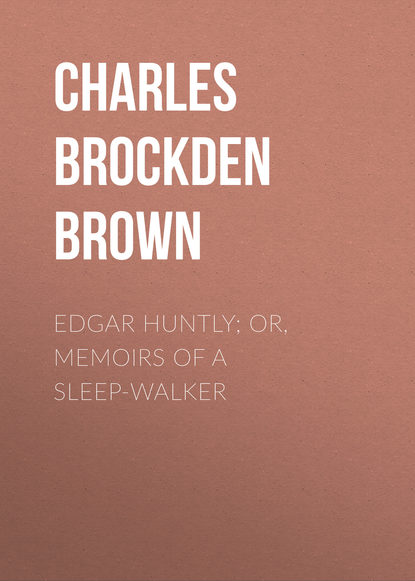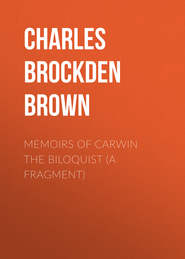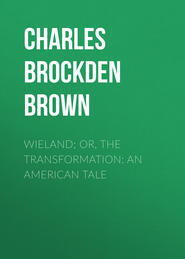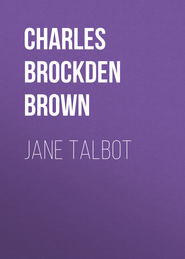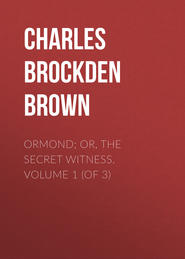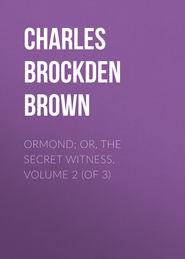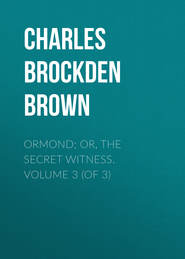По всем вопросам обращайтесь на: info@litportal.ru
(©) 2003-2024.
✖
Edgar Huntly; or, Memoirs of a Sleep-Walker
Настройки чтения
Размер шрифта
Высота строк
Поля
These circumstances were related to me by Inglefield and corroborated by his housekeeper. One consequence inevitably flowed from them. The sleep-walker, he who had led me through so devious a tract, was no other than Clithero. There was, likewise, a strong relation between this person and him who stopped at the gate. What was the subject of discourse between them? In answer to Miss Inglefield's interrogatories, he merely said that the traveller inquired whither the road led which, at a small distance forward, struck out of the principal one. Considering the length of the interview, it was not likely that this was the only topic.
My determination to confer with him in private acquired new force from these reflections. Inglefield assented to my proposal. His own affairs would permit the absence of his servant for one day. I saw no necessity for delay, and immediately made my request to Clithero. I was fashioning an implement, I told him, with respect to which I could not wholly depend upon my own skill. I was acquainted with the dexterity of his contrivances, and the neatness of his workmanship. He readily consented to assist me on this occasion. Next day he came. Contrary to my expectation, he prepared to return home in the evening. I urged him to spend the night with us: but no; it was equally convenient, and more agreeable to him, to return.
I was not aware of this resolution. I might, indeed, have foreseen that, being conscious of his infirmity, he would desire to avoid the scrutiny of strangers. I was painfully disconcerted; but it occurred to me, that the best that could be done was to bear him company, and seize some opportunity, during this interval, of effecting my purpose. I told him, that, since he would not remain, I cared not if, for the sake of recreation, and of a much more momentous purpose, I went along with him. He tacitly, and without apparent reluctance, consented to my scheme, and, accordingly, we set off together. This was an awful crisis. The time had now come that was to dissipate my uncertainty. By what means should I introduce a topic so momentous and singular? I had been qualified by no experience for rightly conducting myself on so critical an emergency. My companion preserved a mournful and inviolable silence. He afforded me no opening by which I might reach the point in view. His demeanour was sedate, while I was almost disabled, by the confusion of my thoughts, to utter a word.
It was a dreadful charge that I was about to insinuate. I was to accuse my companion of nothing less than murder. I was to call upon him for an avowal of his guilt. I was to state the ground of my suspicions, and desire him to confute or confirm them. In doing this, I was principally stimulated by an ungovernable curiosity; yet, if I intended not the conferring of a benefit, I did not, at least, purpose the infliction of evil. I persuaded myself that I was able to exclude from my bosom all sanguinary or vengeful impulses; and that, whatever should be the issue of this conversation, my equanimity would be unsubdued.
I revolved various modes of introducing the topic by which my mind was engaged. I passed rapidly from one to another. None of them were sufficiently free from objection to allow me to adopt it. My perplexity became, every moment, more painful, and my ability to extricate myself, less.
In this state of uncertainty, so much time elapsed, that the elm at length appeared in sight. This object had somewhat of a mechanical influence upon me. I stopped short, and seized the arm of my companion. Till this moment, he appeared to have been engrossed by his own reflections, and not to have heeded those emotions which must have been sufficiently conspicuous in my looks.
This action recalled him from his reverie. The first idea that occurred to him, when he had noticed my behaviour, was, that I was assailed by some sudden indisposition.
"What is the matter?" said he, in a tone of anxiety: "are you not well?"
"Yes," replied I,–"perfectly well. But stop a moment; I have something to say to you."
"To me?" answered he, with surprise.
"Yes," said I. "Let us turn down this path," (pointing, at the same time, to that along which I had followed him the preceding night.)
He now partook, in some degree, of my embarrassment.
"Is there any thing particular?" said he, in a doubting accent. There he stopped.
"Something," I answered, "of the highest moment. Go with me down this path. We shall be in less danger of interruption."
He was irresolute and silent, but, seeing me remove the bars and pass through them, he followed me. Nothing more was said till we entered the wood. I trusted to the suggestions of the moment. I had now gone too far to recede, and the necessity that pressed upon me supplied me with words. I continued:–
"This is a remarkable spot. You may wonder why I have led you to it. I ought not to keep you in suspense. There is a tale connected with it, which I am desirous of telling you. For this purpose I have brought you hither. Listen to me."
I then recapitulated the adventures of the two preceding nights. I added nothing, nor retrenched any thing. He listened in the deepest silence. From every incident, he gathered new cause of alarm. Repeatedly he wiped his face with his handkerchief, and sighed deeply. I took no verbal notice of these symptoms. I deemed it incumbent on me to repress nothing. When I came to the concluding circumstance, by which his person was identified, he heard me without any new surprise. To this narrative I subjoined the inquiries that I had made at Inglefield's, and the result of those inquiries. I then continued in these words:–
"You may ask why I subjected myself to all this trouble. The mysteriousness of these transactions would have naturally suggested curiosity in any one. A transient passenger would probably have acted as I have done. But I had motives peculiar to myself. Need I remind you of a late disaster? That it happened beneath the shade of this tree? Am I not justified in drawing certain inferences from your behaviour? What they are, I leave you to judge. Be it your task to confute or confirm them. For this end I have conducted you hither.
"My suspicions are vehement. How can they be otherwise? I call upon you to say whether they be just."
The spot where we stood was illuminated by the moon, that had now risen, though all around was dark. Hence his features and person were easily distinguished. His hands hung at his side. His eyes were downcast, and he was motionless as a statue. My last words seemed scarcely to have made any impression on his sense. I had no need to provide against the possible suggestions of revenge. I felt nothing but the tenderness of compassion. I continued, for some time, to observe him in silence, and could discover no tokens of a change of mood. I could not forbear, at last, to express my uneasiness at the fixedness of his features and attitude.
"Recollect yourself. I mean not to urge you too closely. This topic is solemn, but it need not divest you of the fortitude becoming a man."
The sound of my voice startled him. He broke from me, looked up, and fixed his eyes upon me with an expression of affright. He shuddered and recoiled as from a spectre. I began to repent of my experiment. I could say nothing suitable to this occasion. I was obliged to stand a silent and powerless spectator, and to suffer this paroxysm to subside of itself. When its violence appeared to be somewhat abated, I resumed:–
"I can feel for you. I act not thus in compliance with a temper that delights in the misery of others. The explanation that I have solicited is no less necessary for your sake than for mine. You are no stranger to the light in which I viewed this man. You have witnessed the grief which his fate occasioned, and the efforts that I made to discover and drag to punishment his murderer. You heard the execrations that I heaped upon him, and my vows of eternal revenge. You expect that, having detected the offender, I will hunt him to infamy and death. You are mistaken. I consider the deed as sufficiently expiated.
"I am no stranger to your gnawing cares; to the deep and incurable despair that haunts you, to which your waking thoughts are a prey, and from which sleep cannot secure you. I know the enormity of your crime, but I know not your inducements. Whatever they were, I see the consequences with regard to yourself. I see proofs of that remorse which must ever be attendant on guilt.
"This is enough. Why should the effects of our misdeeds be inexhaustible? Why should we be debarred from a comforter? An opportunity of repairing our errors may, at least, be demanded from the rulers of our destiny.
"I once imagined that he who killed Waldegrave inflicted the greatest possible injury on me. That was an error, which reflection has cured. Were futurity laid open to my view, and events, with their consequences, unfolded, I might see reason to embrace the assassin as my best friend. Be comforted."
He was still incapable of speaking; but tears came to his relief. Without attending to my remonstrances, he betrayed a disposition to return. I had, hitherto, hoped for some disclosure, but now feared that it was designed to be withheld. He stopped not till we reached Inglefield's piazza. He then spoke, for the first time, but in a hollow and tremulous voice:–
"You demand of me a confession of crimes. You shall have it. Some time you shall have it. When it will be, I cannot tell. Something must be done, and shortly."
He hurried from me into the house, and, after a pause, I turned my steps home wards. My reflections, as I proceeded, perpetually revolved round a single point. These were scarcely more than a repetition, with slight variations, of a single idea.
When I awoke in the morning, I hied, in fancy, to the wilderness. I saw nothing but the figure of the wanderer before me. I traced his footsteps anew, retold my narrative, and pondered on his gestures and words. My condition was not destitute of enjoyment. My stormy passions had subsided into a calm, portentous and awful. My soul was big with expectation. I seemed as if I were on the eve of being ushered into a world whose scenes were tremendous but sublime. The suggestions of sorrow and malice had, for a time, taken their flight, and yielded place to a generous sympathy, which filled my eyes with tears, but had more in it of pleasure than of pain. That Clithero was instrumental to the death of Waldegrave, that he could furnish the clue explanatory of every bloody and mysterious event that had hitherto occurred, there was no longer the possibility of doubting. "He, indeed," said I, "is the murderer of excellence; and yet it shall be my province to emulate a father's clemency, and restore this unhappy man to purity and to peace."
Day after day passed, without hearing any thing of Clithero. I began to grow uneasy and impatient. I had gained so much, and by means so unexpected, that I could more easily endure uncertainty with respect to what remained to be known. But my patience had its limits. I should, doubtless, have made use of new means to accelerate this discovery, had not his timely appearance made them superfluous.
Sunday being at length arrived, I resolved to go to Inglefield's, seek an interview with his servant, and urge him, by new importunities, to confide to me the secret. On my way thither, Clithero appeared in sight. His visage was pale and wan, and his form emaciated and shrunk. I was astonished at the alteration which the lapse of a week had made in his appearance. At a small distance I mistook him for a stranger. As soon as I perceived who it was, I greeted him with the utmost friendliness. My civilities made little impression on him, and he hastened to inform me, that he was coming to my uncle's, for the purpose of meeting and talking with me. If I thought proper, we would go into the wood together, and find some spot where we might discourse at our leisure and be exempt from interruption.
You will easily conceive with what alacrity I accepted his invitation. We returned from the road into the first path, and proceeded in silence, till the wildness of the surrounding scenery informed us that we were in the heart of Norwalk. We lighted on a recess, to which my companion appeared to be familiar, and which had all the advantages of solitude, and was suitable to rest. Here we stopped. Hitherto my companion had displayed a certain degree of composure. Now his countenance betokened a violent internal struggle. It was a considerable time before he could command his speech. When he had so far effected the conquest of his feelings, he began.
Chapter IV
You call upon me for a confession of my offences. What a strange fortune is mine! That a human being, in the present circumstances, should make this demand, and that I should be driven, by an irresistible necessity, to comply with it! That here should terminate my calamitous series! That my destiny should call upon me to lie down and die, in a region so remote from the scene of my crime; at a distance so great from all that witnessed and endured their consequences!
You believe me to be an assassin. You require me to explain the motives that induced me to murder the innocent. While this is your belief, and this the scope of your expectations, you may be sure of my compliance. I could resist every demand but this.
For what purpose have I come hither? Is it to relate my story? Shall I calmly sit here, and rehearse the incidents of my life? Will my strength be adequate to this rehearsal? Let me recollect the motives that governed me, when I formed this design. Perhaps a strenuousness may be imparted by them which, otherwise, I cannot hope to obtain. For the sake of those, I consent to conjure up the ghost of the past, and to begin a tale that, with a fortitude like mine, I am not sure that I shall live to finish.
You are unacquainted with the man before you. The inferences which you have drawn, with regard to my designs and my conduct, are a tissue of destructive errors. You, like others, are blind to the most momentous consequences of your own actions. You talk of imparting consolation. You boast the beneficence of your intentions. You set yourself to do me a benefit. What are the effects of your misguided zeal and random efforts? They have brought my life to a miserable close. They have shrouded the last scene of it in blood. They have put the seal to my perdition.
My misery has been greater than has fallen to the lot of mortals. Yet it is but beginning. My present path, full as it is of asperities, is better than that into which I must enter when this is abandoned. Perhaps, if my pilgrimage had been longer, I might, at some future day, have lighted upon hope. In consequence of your interference, I am forever debarred from it. My existence is henceforward to be invariable. The woes that are reserved for me are incapable alike of alleviation or intermission.
But I came not hither to recriminate. I came not hither to accuse others, but myself. I know the retribution that is appointed for guilt like mine. It is just. I may shudder at the foresight of my punishment and shrink in the endurance of it; but I shall be indebted for part of my torment to the vigour of my understanding, which teaches me that my punishment is just. Why should I procrastinate my doom and strive to render my burden more light? It is but just that it should crush me. Its procrastination is impossible. The stroke is already felt. Even now I drink of the cup of retribution. A change of being cannot aggravate my woe. Till consciousness itself be extinct, the worm that gnaws me will never perish.
Fain would I be relieved from this task. Gladly would I bury in oblivion the transactions of my life. But no! My fate is uniform. The demon that controlled me at first is still in the fruition of power. I am entangled in his fold, and every effort that I make to escape only involves me in deeper ruin. I need not conceal, for all the consequences of disclosure are already experienced. I cannot endure a groundless imputation, though to free me from it I must create and justify imputations still more atrocious. My story may at least be brief. If the agonies of remembrance must be awakened afresh, let me do all that in me lies to shorten them.
I was born in the county of Armagh. My parents were of the better sort of peasants, and were able to provide me with the rudiments of knowledge. I should doubtless have trodden in their footsteps, and have spent my life in the cultivation of their scanty fields, if an event had not happened, Which, for a long time, I regarded as the most fortunate of my life, but which I now regard as the scheme of some infernal agent, and as the primary source of all my calamities.
My father's farm was a portion of the demesne of one who resided wholly in the metropolis and consigned the management of his estates to his stewards and retainers. This person married a lady who brought him great accession of fortune. Her wealth was her only recommendation in the eyes of her husband, (whose understanding was depraved by the prejudices of luxury and rank,) but was the least of her attractions in the estimate of reasonable beings.
They passed some years together. If their union were not a source of misery to the lady, she was indebted for her tranquillity to the force of her mind. She was, indeed, governed, in every action of her life, by the precepts of duty, while her husband listened to no calls but those of pernicious dissipation. He was immersed in all the vices that grow out of opulence and a mistaken education.
Happily for his wife, his career was short. He was enraged at the infidelity of his mistress, to purchase whose attachment he had lavished two-thirds of his fortune. He called the paramour, by whom he had been supplanted, to the field. The contest was obstinate, and terminated in the death of the challenger.
This event freed the lady from many distressful and humiliating obligations. She determined to profit by her newly-acquired independence, to live thenceforward conformably to her notions of right, to preserve and improve, by schemes of economy, the remains of her fortune, and to employ it in the diffusion of good. Her plans made it necessary to visit her estates in the distant provinces.
During her abode in the manor of which my father was a vassal, she visited his cottage. I was at that time a child. She was pleased with my vivacity and promptitude, and determined to take me under her own protection. My parents joyfully acceded to her proposal, and I returned with her to the capital.
She had an only son of my own age. Her design, in relation to me, was that I should be educated with her child, and that an affection, in this way, might be excited in me towards my young master, which might render me, when we should attain to manhood, one of his most faithful and intelligent dependants. I enjoyed, equally with him, all the essential benefits of education. There were certain accomplishments, from which I was excluded, from the belief that they were unsuitable to my rank and station. I was permitted to acquire others, which, had she been actuated by true discernment, she would, perhaps, have discovered to be far more incompatible with a servile station. In proportion as my views were refined and enlarged by history and science, I was likely to contract a thirst of independence, and an impatience of subjection and poverty.
When the period of childhood and youth was past, it was thought proper to send her son to improve his knowledge and manners by a residence on the continent. This young man was endowed with splendid abilities. His errors were the growth of his condition. All the expedients that maternal solicitude and wisdom could suggest were employed to render him a useful citizen. Perhaps this wisdom was attested by the large share of excellence which he really possessed; and that his character was not unblemished proved only that no exertions could preserve him from the vices that are inherent in wealth and rank, and which flow from the spectacle of universal depravity.
As to me, it would be folly to deny that I had benefited by my opportunities of improvement. I fulfilled the expectation of my mistress, in one respect. I was deeply imbued with affection for her son, and reverence for herself. Perhaps the force of education was evinced in those particulars, without reflecting any credit on the directors of it. Those might merit the name of defects, which were regarded by them as accomplishments. My unfavourable qualities, like those of my master, were imputed to my condition, though, perhaps, the difference was advantageous to me, since the vices of servitude are less hateful than those of tyranny.





